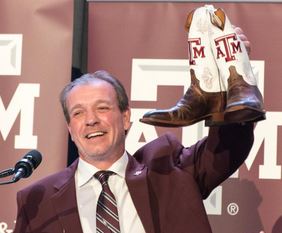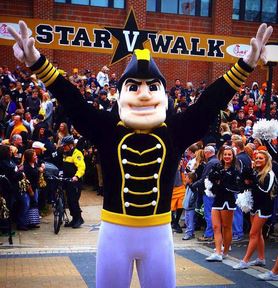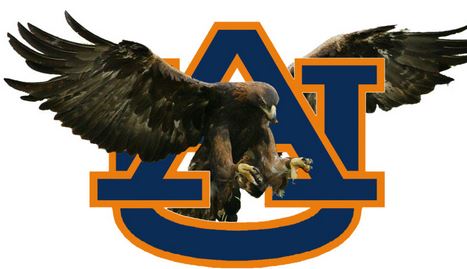Podcast: Play in new window | Download
Subscribe: RSS
On Monday, Auburn University hired John Cohen to become the school’s newest Athletics Director. Cohen jumped ship from SEC rival, Mississippi State. Just a few months ago in July, John Cohen signed a new four-year extension to remain the AD at Mississippi State. The agreement contained a buyout option for a mere $750,000.
That is considered “peanuts” in today’s financial warfare called major college athletics.
Within one hour of the announcement of Auburn’s new Athletics Director, the Tigers’ head football coach, Bryan Harsin, was terminated.

Harsin had been quite successful at Boise State University. Just 45 years of age, the coach posted successful 85-36 record at Boise State prior to coming into the SEC at Auburn.
Bryan Harsin’s tenure at Auburn lasted less than two years.
This season’s 3-5 start (following a 6-7 campaign in 2021) was enough for many of the impatient (but wealthy) athletic supporters at Auburn. The War Eagles’ war chest will help defray $15.5 million worth of contract buyout costs associated with the newly dismissed football coach.

Lest we forget, Auburn paid over $21 million just two years ago to vanquish the previous head football coach, Gus Malzahn. His record was “only” 68-34 in eight years on the Plains.
By making so many coaching moves, high school recruits will certainly think twice prior to committing to a university whose head football coach may be unlikely to stay there as long as the player will.
Big names such as current Ole Miss coach Lane Kiffin, former Carolina Panthers (and Baylor) head coach Matt Rhule, and Jackson State’s Deion Sanders already headline the rumor parade. Liberty University coach Hugh Freese just signed a new contract extension last weekend, but his name has already surfaced this week as a possibility for the Auburn job.

To obtain the services of either Lane Kiffin, Hugh Freese, or (perhaps) Deion Sanders, Auburn will need to tap their piggy bank again soon and pay millions to another university to buy-out that coach’s current contract obligations.
Instead of toilet paper thrown onto the trees at Toomer’s Corner in downtown Auburn after a major victory, the school’s major financial supporters seem to be equally comfortable using large denominations of paper money in order to hire new football coaches.

At least for now, cost apparently isn’t a big factor at Auburn when it comes to fielding a competitive football team again.
From my perspective, it seems like many college football teams are just like our old cartoon friend, Wile E. Coyote.
Just like the Roadrunner’s long-time nemesis, an increasing number of major college football programs keep coming up with another “can’t miss” head football coach. After a few years, though, the disappointed school hands a big exit check to that same coach as he (and the school’s athletics reputation) sails over the cliff to the expected conclusion.

Poof!
LSU understands your pain, Auburn.
In 2016, LSU’s former head football coach Les Miles was owed about $15 million after he was relieved of his duties following an ugly home loss to (you guessed it) Auburn.
After completing the season as the Tigers’ interim head coach, Ed Orgeron was named the permanent replacement for Miles.
Just like Coach Miles did back in 2007, Ed Orgeron led LSU to a national championship in football. The 2019 LSU Tigers went a perfect 15-0 with Orgeron winning a variety of “Coach of the Year” honors. Less than two years later, Coach O was relieved of his duties near the end of 2021 after the school agreed to pay his contract buyout of nearly $17 million.

Ed Orgeron’s image as a fun-loving Cajun was enhanced after he reportedly told the LSU Athletics Director, “So, what time to you want me to leave?”
Meanwhile in College Station, Texas, the wealthy backers of Texas A&M are having second thoughts about their own football coach, Jimbo Fisher. The Aggies (rated #6 in the AP Preseason poll) lost again Saturday night to Ole Miss and dropped to 3-5 this year (the same record as Auburn).
Unlike Auburn and LSU’s money dilemma to send their coaches’ home, the Aggies’ disappointment with coach Jimbo Fisher would cost them a Texas-sized $86 million to send him to the house.

Originally signed to a 10-year $75 million (all guaranteed) contract, the Aggies doubled-down on Fisher after the COVID-shortened 2020 season saw Texas A&M post a 9-1 record. The school’s deep-pocketed athletic supporters rewarded their coach by upgrading his long-term contract. .
Beginning in 2021, Jimbo’s jumbo contract became a 10-year, $95 million deal (all guaranteed money).
If the Aggies wanted to boot their coach in 2022, it will cost them $86 million.
Texas A&M football fans must feel like Wile E. Coyote about to go over that cliff right about now.

The previous coach at Texas A&M, Kevin Sumlin, was fired after posting a similar won-loss record as his replacement, the highly paid Jimbo Fisher, owns today in AggieLand. Go figure.
As the money keeps flying around college football coaching (especially in the SEC), let’s step back from the cliff’s edge and ponder a few common sense issues.
Is a head football coach really worth that much money to a major college football program?
In the case of Texas A&M, a report indicated that the football program (despite the high costs associated with the coaching staff) still generates about $35 million in net profits annually. The Aggies men’s basketball team was the only other profitable sport at the school. All other athletic programs have been losing money to some degree and are, in effect, being subsidized by the football program’s large pile of revenue.

Each SEC school received an estimated $55 million in 2021 from various television contracts negotiated by the league. It’s safe to assume that 90% (or more) of that $55 million comes from the college football broadcast rights.
That means that about $50 million per year of football revenue is handed back to each SEC school from television.
A 2018 report by a Baton Rouge television station said that the college football programs at Auburn and LSU each generated a total of $112 million in total revenue (that’s TV, ticket sales, merchandising, etc.). That results in a net annual football profit of over $50 million after deducting the costs of coaching salaries and other operating expenses.
At LSU, the annual revenue from home stadium football tickets was reportedly about $40 million per season (assuming a seven game home schedule).
If LSU’s home attendance should drop by 25% after a few years of fielding a mediocre football team, it would create a $10 million annual shortfall for school’s athletic department. Imagine the problems that might cause for the other sports programs on campus.
By contrast, the Vanderbilt Commodores are (generally) not very competitive in football. Vandy has posted a winning record in the SEC just twice in the past 40 years (1982 and 2012).

The team’s current football coach, Clark Lea, earns $3 million (lowest in the SEC).
Home attendance at Vanderbilt football usually hovers around 30,000 per game in the team’s cozy 40,000 seat stadium in Nashville. The home attendance benefits from games against visiting SEC teams such as (this year) Ole Miss, South Carolina, Florida, and Tennessee.
This Saturday, Vanderbilt (3-5) will host the 4-4 Florida Gators. Plenty of good seats are available at ticket prices ranging from $50 to $70 each. Assuming an average price of $60 at this 40,000 seat stadium, a sell-out would bring $2.4 million in ticket revenue for the game.
If this week’s game was held in Florida’s home stadium, a crowd of 85,000 would bring in nearly $6 million into the Gators’ bank account. That’s a $3.5 million difference – per home game.
So, it makes economic sense that schools with smaller football venues (such as Vanderbilt) should minimize their expenses (coaching salaries in particular) while attempting to maximize lucrative television revenues from being a member of the SEC.
College football teams with the largest venues (such as Auburn’s 87,450 seat Jordan-Hare Stadium) must calculate how much incremental revenue may be earned (or lost) if the football facility isn’t filled to capacity for the team’s seven home football games every year.
Because the school’s net profits from the football program are so high, it becomes more understandable why Auburn (or any college team with a large stadium to fill on Saturdays) may be willing to spend more (and risk more) money to lure the best coaches.
At some point, the university may risk losing the financial support from its wealthy alumni and friends of the university if the football team shows little chance of chasing that elusive college football Holy Grail called the NCAA championship.

With 131 large division FBS teams competing but only one winner crowned as champion each year, every college football program must carefully weigh its own financial options. How much money do you want to put at risk to hire new coaches, upgrade your facilities, and add other amenities?
Uniquely at Auburn, watching your intrastate rival at the University of Alabama win a national championship five times in the past 13 seasons must be quite painful. Compounding the problem, the state of Georgia (located just twenty miles east of Auburn) had a national champion football team in 2021. The Bulldogs are contending once again this season.
Auburn is situated right in the middle of these two SEC football powerhouses. The pressure to compete at the same level as Bama and Georgia is quite intense for Auburn’s fan base.
That may be the biggest reason why Auburn football supporters keep shelling out the dough to buy (and dismiss) expensive football coaches. They must keep their program relevant in order to attract 87,450 fans into their cavernous football stadium.

If Auburn’s football program was a stock, I would suggest that you “Hold”. Though Auburn’s fervent fans would love to return to the national title conversation again soon, this is going to take a few years.
In the South, the word “patience” (as it concerns your favorite SEC football program) doesn’t seem to sit very well with most college football fans.
Good luck to Auburn as they embark on hiring a third football coach in the past four years.

Perhaps, this time, money can buy your fans’ love!

